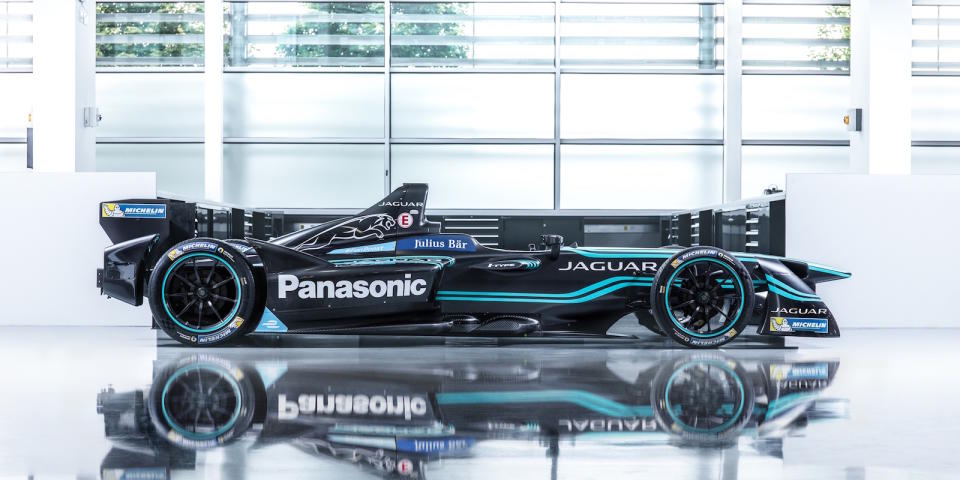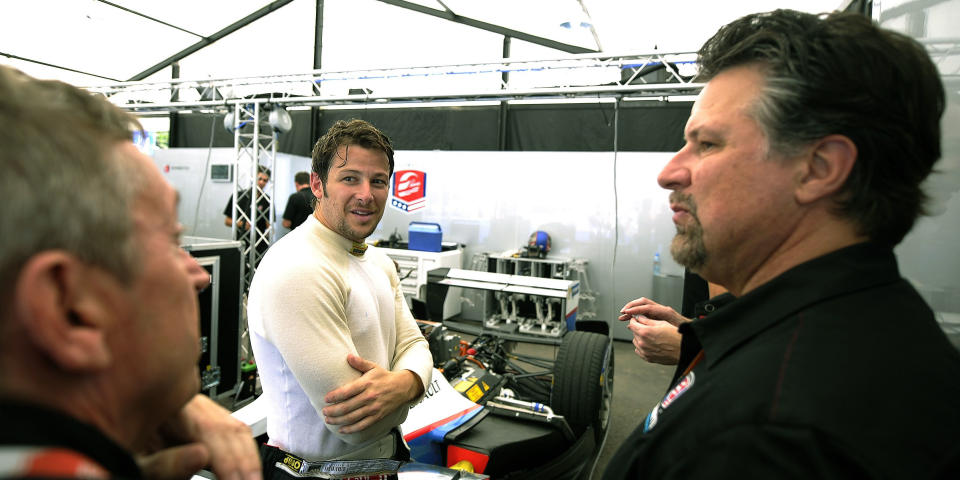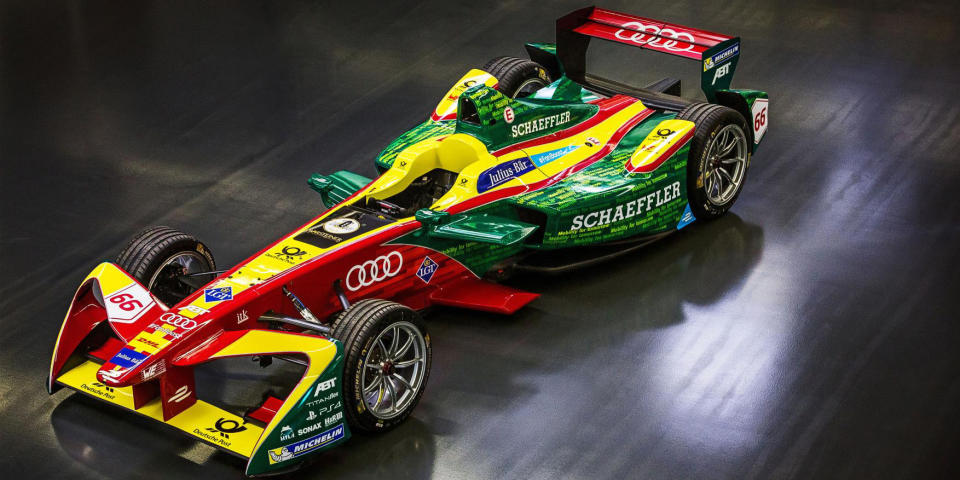Formula E Is Succeeding Where F1 and IndyCar Are Failing

Formula E does nothing for me at this stage of its existence. Painfully slow electric cars with limited range makes for an unrewarding spectacle, but the brainchild of Alejandro Agag is finally starting to make inroads on its closest rivals in one key area as its new season approaches in October.
Formula 1 and IndyCar have longstanding relationships with multiple auto manufacturers whose engines and marketing dollars make racing possible for the world's leading open-wheel series, and yet, with their respective history and reach in mind, they struggle to bring new brands into the sport.
F1 is the most popular and IndyCar provides the best racing, but when it comes to enticing car companies to invest and develop new technologies, Formula E has its big brothers covered.
It's an interesting dichotomy to consider. Compared to almost every other form of racing, Formula E is a boring mess. Short on thrills and compelling sounds, it should be headed for disaster; take one look at the companies that continue to stream in, however, and it becomes evident that speed and spectacle have little to do with its growing appeal to the auto industry.

So why would Audi, BMW, Citroen, Jaguar, and Renault, along with three specialist EV firms, side with Formula E? It's all about the rules and exposure.
F1 has utilized hybrid, battery-assisted powertrains since 2009, and its current roster of auto manufacturers sits at four with Ferrari, Honda, Mercedes-Benz, and Renault spending hundreds of millions on irrelevance. Fans don't watch F1 for its hybrid-ness, and the series places heavy restrictions on the type of hybrid technology that is allowed. If you're looking for a hotbed of hybrid development, it isn't happening on the grand prix trail.
IndyCar has been at two manufacturers since 2013 with Chevy and Honda splitting its grid, and despite calls from Honda to open its rulebook, IndyCar remains closed to hybrids. For manufacturers with an interest in electric propulsion, competing with other like-minded manufacturers, and running in a series where outrageous costs or a complete dismissal of the technology are missing, Formula E has become the one and only solution to consider.
Michael Andretti has a unique perspective on the topic as the only person who owns IndyCar and Formula E teams, and with his personal-and his father's-legacy in Formula 1, the Pennsylvanian can speak to all three sides of the discussion.
"All manufacturers are seriously looking at electric," he told RoadandTrack.com. "To the point where some have committed their whole line of cars are going to be electric by 2025. So it's natural for them to want to gravitate to the new technology of electric racing.

"That's a little different from here in IndyCar but I said to [IndyCar competition president] Jay Frye, I would really think about the next engine formula needs to be looked at a little different. I think you have to look at it more about what is happening with the future and maybe go hydrogen or something different. I think you have to make it relevant for what is happening in the world."
As the auto industry looks for more ways to reduce emissions generated by internal combustion engines (ICE), those solutions-electric, hydrogen, or otherwise-would become options for use in competition. Just as the ICE+electric option has become the standard in F1, and in the FIA World Endurance Championship's LMP1 Hybrid class, there's great marketing value in racing and promoting something new that doesn't involve pumping more exhaust gasses into the atmosphere.
And as much as I don't love all-electric racing, there's no point in denying the fact that more manufacturers are siding with Formula E right now than the old establishment series.
"Raise the game, that's what they need to," Andretti added. "That's the only way they're going to get future manufacturers here in IndyCar by doing something that is relevant."
Asked if he thought Formula E is becoming a haven for manufacturers because it's enacting a finely-crafted plan to engage the auto industry, or its popularity with manufacturers is simply because it's the only pure electric option in the open-wheel racing world, Andretti said "I think it is mostly electric, but because it is electric, there is the green aspect. The green aspect makes it relevant for countries and cities to have a race downtown. That's one of the big problems for [IndyCar] if we have a race downtown is noise. You don't have a problem with the electric series.
"That is a little different than what anybody else has. Their whole thing is, it's like when they first talked to us, everything you know about racing just put it over here on the side because you'll need to get into this with a new open mind. I think Alejandro and the group have done a tremendous job. And they're literally getting two cities for races that [F1 boss] Bernie [Ecclestone] would have killed to be in. They're getting downtown London, downtown Paris. I mean, it's going to be downtown Hong Kong. It's impressive."
Even though Formula E has done little to win the hearts and minds of purebred racing fans, Andretti sees the eventual rise in speeds as a ticket to earning legitimacy as a form of motorized entertainment.
"It's a new technology in its infancy, and I think five, six or seven years from now were going to be going close to 200 on the straightaways," he said. "They already accelerate incredibly well, just obviously the top end. But eventually it is going to get there. But you have to have patience with the technology. To let it get there.
"I think there's a real future in this and it is difficult for older guys who just hate it. It is the future and you have to look at kids today, too. They care about the planet. It makes it relevant for kids to watch it and to see its trying to be part of the solution. The problem is our [racing] traditionalists are getting older and we are not getting the younger fans. This may be a way to still keep a young fans attention towards racing."
The most compelling argument for Formula 1 and IndyCar to take a different approach to electrified racing, or any other alternative to an ICE reliance, could be found in the boardroom.

"You talk to all these companies and it takes a lot of education, a lot of information to get them up to speed on a regular racing series; the high-tech companies especially," Andretti said. "Start talking about Formula E, and they (sits up in his chair).
"They probably don't know or maybe even care about the other series, but if you can tell them about a green racing series, it's a place where their R&D budgets for electric cars, electric motors, or whatever green programs they have can be showcased, they really listen and want to see how they can get involved.
"I'm telling you, as more time goes on, the more series [like IndyCar] are missing out on big corporate opportunities. Manufacturers are looking for places to spend money to develop their next technologies, and as long as it's in one place, that's the place to be."
Turning back to the 'R' word again-relevance, F1 and IndyCar need those manufacturer and corporate dollars, and most of their teams are starving for infusions of cash. Picture EV-related development deals between manufacturers and teams, just as Formula E has established, and both sides prospering from the relationship.
Trust me when I say that it's the kind of security most F1 and IndyCar teams can only dream of these days. For every Scuderia Ferrari there's a Sauber F1 trying to keep the lights on. For every Team Penske, there's a KVSH Racing doing its best to stay afloat.
I'm not calling for the full electrification of F1 and IndyCar, but those series need to offer something more to an auto industry that is gradually taking its interest and dollars elsewhere. Reestablish the link between an auto industry that wants to reach into the future and the series and teams that can provide the platform and expertise, and everyone's happy.
Until that day arrives, Formula E is where the big transactions will take place.
You Might Also Like

 Yahoo Autos
Yahoo Autos 